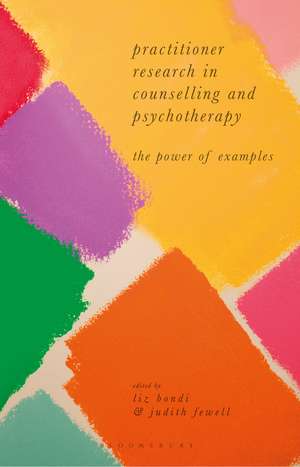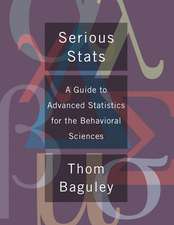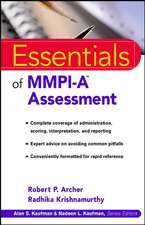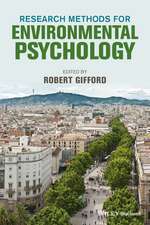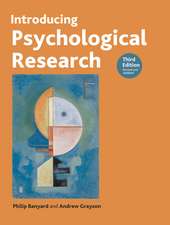Practitioner Research in Counselling and Psychotherapy: The Power of Examples
Autor Liz Bondi, Judith Fewellen Limba Engleză Paperback – 30 iun 2016
Following a close examination of the flaws of dominant approaches to research in the field, the book provides a richly detailed exploration of a diverse range of subjective experiences, from both practitioners and clients.
Written by a collection of authors with a wealth of experience in practice and academia, this insightful and evocative text will inspire anyone undertaking research in this field – be they students, educators or practitioners.
Preț: 237.10 lei
Preț vechi: 288.94 lei
-18% Nou
45.37€ • 47.50$ • 37.54£
Carte tipărită la comandă
Livrare economică 05-19 aprilie
Livrare express 01-07 martie pentru 79.79 lei
Specificații
ISBN-10: 1137390298
Pagini: 248
Ilustrații: 2 diagrams
Dimensiuni: 138 x 216 x 13 mm
Greutate: 0.33 kg
Ediția:1st ed. 2016
Editura: Bloomsbury Publishing
Colecția Bloomsbury Academic
Locul publicării:London, United Kingdom
Caracteristici
Puts forward an approach to counselling research that is in keeping with the values and philosophy of the profession
Bridges the 'practice research gap' with examples of research that evoke the lived experience of counselling and bring out its relevance to practice
A case study about how music and poetry enabled a man diagnosed with schizophrenia living in a psychiatric facility to communicate and develop a positive therapeutic relationship
An exploration of the gender dynamics experienced by a female trainee counsellor working with a depressed male client
Notă biografică
Professor Liz Bondi divides her time between the School of GeoSciences and the School of Health in Social Science, where she is co-Director, at the University of Edinburgh. Her research interests span counselling studies, feminism and emotional geographies. She is a counsellor accredited by COSCA (Counselling and Psychotherapy in Scotland).
Judith Fewell is a Lecturer in Counselling and Psychotherapy at the University of Edinburgh. A registered psychotherapist with the British Psychoanalytic Council, she works part-time for the adult psychotherapy service of the Scottish Institute. She is also accredited by COSCA as a counsellor and diploma level trainer.
Cuprins
PART I: RECLAIMING THE WISDOM OF PRACTICE IN COUNSELLING AND PSYCHOTHERAPY RESEARCH.- 1. Why Does Research So Often Alienate Practitioners and What Can Be Done About It?; Liz Bondi and Judith Fewell.- 2. The Power of Examples; Liz Bondi and Judith Fewell.- 3. Rethinking Supervision and Ethics in Experience-Near Research; Siobhan Canavan and Seamus Prior.- PART II: COMING INTO THERAPEUTIC PRACTICE.- 4. A Trainee Counsellor's Account of Learning to Trust in the Process; Linda Gardner.- 5. Losing Touch: An Exploration of the Place of Touch in Therapeutic Relationships; Anna St Clair.- 6. Why I Became a Counsellor: Reflections on the Counter-transference; Mags Turner.- PART III: CLIENT VOICES.- 7. Working with Early Trauma in Therapy: Emerging from the Shadow of Polio; Connie Johnson.- 8. Regarding 'The Tea-house of the August Moon': Therapeutic Work with a Man with Schizophrenia within a Hospital Context; April Parkins.- 9. A Secret Sorrow: Making a Difference to Bereavement in Prison; Janette Masterton.- 10. 'Reading the Wound': Using Stories to Open up the Nature of Trauma; Linda Talbert.- PART IV: EMBODYING THEORY.- 11. An Investigation of Narratives of Anxiety; Chris Scott.- 12. Hauntings: On Discovering the Lived Experience of Counter-transference; Patrick Fegan.- 13. Working with Mark: Gender in the Consulting Room; Lynne Rollo.- 14. Tolerating the 'Chaos Monsters': Making Sense with Bion; Diana Sim.
Recenzii
Textul de pe ultima copertă
Developing knowledge in the field of counselling and psychotherapy has traditionally been seen to require a specific type of research: one typically undertaken by academics and published in journals, with the express purpose of raising the prestige of the field as a whole. But how are practitioners to apply findings based on generalisations to their unique therapeutic relationships with unique individuals?
In this thought-provoking text, Liz Bondi and Judith Fewell invite practitioners to move away from an approach to research that depends upon distance and objectification, and towards a method centred on practical wisdom developed through intense exploration of the lived experience of therapeutic relationships. Following a close examination of the flaws of dominant approaches to research in the field, the book provides a richly detailed exploration of a diverse range of subjective experiences, from both practitioners and clients. These include a voluntary counsellor's account of working with a bereaved inmate in a Scottish prison, a case study about how music and poetry enabled a man diagnosed with schizophrenia living in a psychiatric facility to communicate and develop a positive therapeutic relationship, and an exploration of the gender dynamics experienced by a female trainee counsellor working with a depressed male client.
Written by a collection of authors with a wealth of experience in practice and academia, this insightful and evocative text will inspire anyone undertaking research in this field – be they students, educators or practitioners.
Descriere
In this thought-provoking text, Liz Bondi and Judith Fewell invite practitioners to move away from an approach to research that depends upon distance and objectification, and towards a method centred on practical wisdom developed through intense exploration of the lived experience of therapeutic relationships.
Following a close examination of the flaws of dominant approaches to research in the field, the book provides a richly detailed exploration of a diverse range of subjective experiences, from both practitioners and clients.
Written by a collection of authors with a wealth of experience in practice and academia, this insightful and evocative text will inspire anyone undertaking research in this field – be they students, educators or practitioners.
